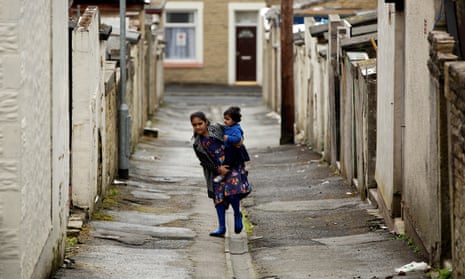The government is to scrap its child poverty target and replace it with a new duty to report levels of educational attainment, worklessness and addiction, rather than relative material disadvantage, work and pensions secretary Iain Duncan Smith has said.
The old target set by Tony Blair, based on the percentage of households with below average income, will continue to be published as a government statistic – but will no longer be seen as a target.
The new measures were largely worked out by Duncan Smith with the Liberal Democrat schools minister, David Laws, in the coalition government. They were shelved when blocked by the chancellor, George Osborne, who was worried about the politics of reforming the system.
The downgrading of the existing target comes before a big cut in tax credits, expected in the 8 July budget as part of a drive to cut the welfare budget.
The cuts to tax credits would have made it even harder to reach the old child poverty target by 2020, the target date set by Labour and the end point of this parliament. Although some MPs welcomed the attempt to focus on the root causes of poverty, the removal of the material income target was denounced by Labour as the obituary notice for compassionate Conservatism.
Duncan Smith told MPs: “Worklessness measures will identify the proportion of children living in workless households and the proportion of children in long-term workless households.
“The educational attainment measures will focus on GCSE attainment for all pupils and for particularly disadvantaged pupils.”
Duncan Smith argued the measures set by Tony Blair are a poor measure of poverty, since families can fall or go above the relative poverty line for reasons that have little to do with their material wealth.
“We know in households with unstable relationships, where debt and addiction destabilise families, where parents lack employment skills, where children just aren’t ready to start school, these children don’t have the same chances in life as others. It is self evident.
“They cannot break out of that cycle of disadvantage. We are currently developing these measures right now – family breakdown, problem debt and drug and alcohol dependency – and we will report each year on these life chances as well.”
Duncan Smith said the child poverty and social mobility commission, chaired by Alan Milburn, the former Labour cabinet minister, will be renamed the social mobility commission.
Duncan Smith has been given the political leeway to make the reforms after the annual child poverty statistics, published by government last week, did not show the widely predicted rise.
Duncan Smith said: “Governments will no longer just focus on moving families above a poverty line, instead we want to focus on making a meaningful change to children’s lives by extending opportunity for all, so both they and their children can escape from the cycle of poverty and improve their life chances.
“This process marks a shift, I hope, from solely measuring inputs of expenditure to measuring the outcomes of children-focused policy.”
He continued: “The problem with the statutory framework set around the relative income measure has become ... all too apparent.
“At 60% of median income, if you sit below the line you are said to be poor, if you sit above it you are not. Asking government to raise everyone above that set percentage, I think, has led often to unintended consequences for good reasons.”
Duncan Smith cited “massive spikes” in tax credit spending ahead of the 2005 and 2010 elections. He said between 2002 and 2010, spending on tax credits “more than doubled” to £258 billion, while overall welfare spending was up 60% in real terms.
The former Labour health secretary, Alan Milburn, said: “It has long been obvious that the existing child poverty targets are not going to be met. In fact, they will be missed by a country mile. The commission has argued in the past that a more rounded way of measuring poverty – taking greater account of causal risk factors – is sensible.”
He added: “It is not credible to try to improve the life chances of the poor without acknowledging the most obvious symptom of poverty: lack of money. Unless the government sets out a clear target for improving the life chances of the poorest families, its agenda for healing social division in our country will lack both ambition and credibility.
“Abolishing the legal targets doesn’t make the issue of child poverty go away,” Milburn continued. “It remains a deep scar in the fabric of our nation. The key issue is less how child poverty is measured and more how it is tackled. Far more needs to be done to make sure that the poorest families share in the proceeds of economic growth.
“When two in three poor children are nowadays in families where someone is in work, the priority has to be to tackle in-work poverty. That’s why we look to the government to champion the living wage and to ensure that welfare cuts do not fall exclusively on the working poor.
The acting shadow work and pensions minister, Stephen Timms, quoted comments from David Cameron in 2006, when he said: “Poverty is relative and those who pretend otherwise are wrong.
“The prime minister promised that a government he led would – I quote – ‘act on relative poverty’. Why is that promise being broken?”
Child Poverty Action Group also voiced concerns: “The statement isn’t about strengthening efforts to end child poverty, but about burying the failure of the government’s child poverty approach. And with more cuts coming down the line, child poverty is set to rise.”

Comments (…)
Sign in or create your Guardian account to join the discussion